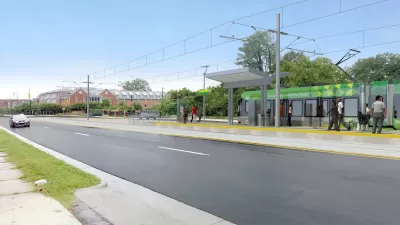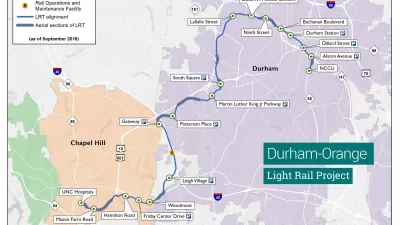A 37-mile commuter rail line under study in North Carolina could connect cities Raleigh, Cary, and Durham in North Carolina, but the system will cost a pretty penny, and it will have to succeed where light rail previously failed.

Richard Stradling reports: "A commuter rail system running 40 trains each weekday between Garner and Durham would cost $1.4 billion to $1.8 billion to build and carry 7,500 to 10,000 passengers a day, according to preliminary estimates from the regional transit agency GoTriangle."
According to the feasibility study released by GoTriangle last week, the 37-mile route studied by GoTriangle would require 34 miles of new tracks to connect Raleigh, Cary, and Durham. Another three miles would use an existing corridor currently owned by the N.C. Railroad.
"The feasibility study from GoTriangle provides the most refined details to date about the commuter rail system proposed by transit plans in both Durham and Wake counties," according to Stradling.
Casting a shadow over the potential of the project to win the financial and political support necessary to succeed is the recent—March 2019—demise of the Durham-Orange Light Rail project.
FULL STORY: Commuter rail in Wake and Durham counties would cost up to $1.8 billion, study says

Planetizen Federal Action Tracker
A weekly monitor of how Trump’s orders and actions are impacting planners and planning in America.

Congressman Proposes Bill to Rename DC Metro “Trump Train”
The Make Autorail Great Again Act would withhold federal funding to the system until the Washington Metropolitan Area Transit Authority (WMATA), rebrands as the Washington Metropolitan Authority for Greater Access (WMAGA).

DARTSpace Platform Streamlines Dallas TOD Application Process
The Dallas transit agency hopes a shorter permitting timeline will boost transit-oriented development around rail stations.

Renters Now Outnumber Homeowners in Over 200 US Suburbs
High housing costs in city centers and the new-found flexibility offered by remote work are pushing more renters to suburban areas.

The Tiny, Adorable $7,000 Car Turning Japan Onto EVs
The single seat Mibot charges from a regular plug as quickly as an iPad, and is about half the price of an average EV.

Supreme Court Ruling in Pipeline Case Guts Federal Environmental Law
The decision limits the scope of a federal law that mandates extensive environmental impact reviews of energy, infrastructure, and transportation projects.
Urban Design for Planners 1: Software Tools
This six-course series explores essential urban design concepts using open source software and equips planners with the tools they need to participate fully in the urban design process.
Planning for Universal Design
Learn the tools for implementing Universal Design in planning regulations.
Roanoke Valley-Alleghany Regional Commission
City of Mt Shasta
City of Camden Redevelopment Agency
City of Astoria
Transportation Research & Education Center (TREC) at Portland State University
US High Speed Rail Association
City of Camden Redevelopment Agency
Municipality of Princeton (NJ)





























